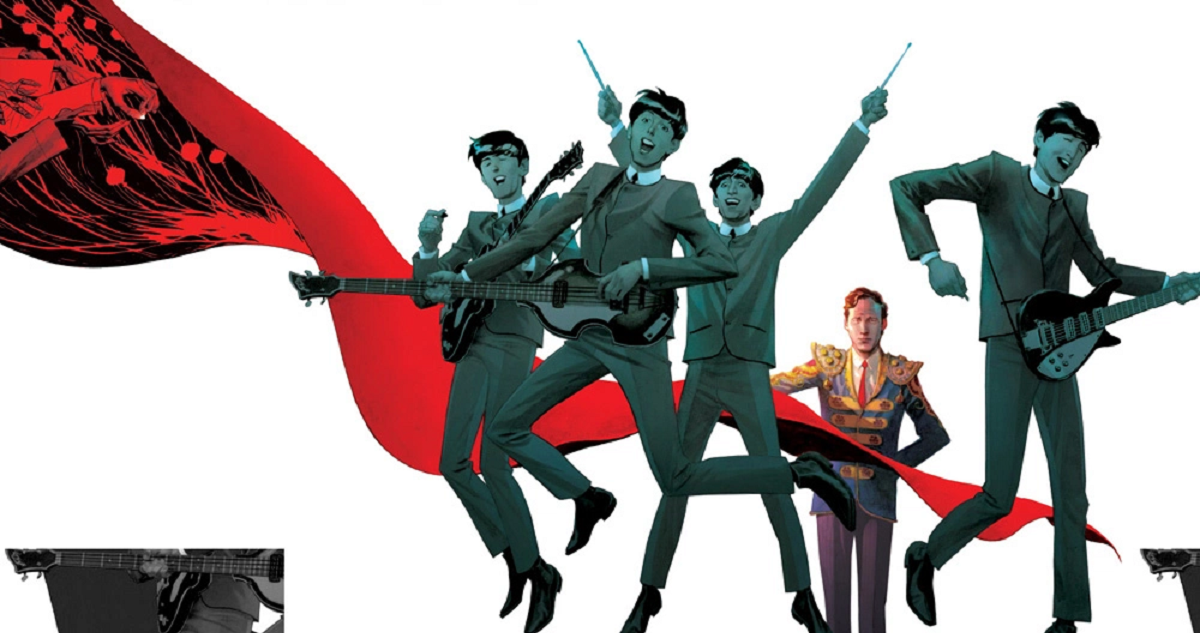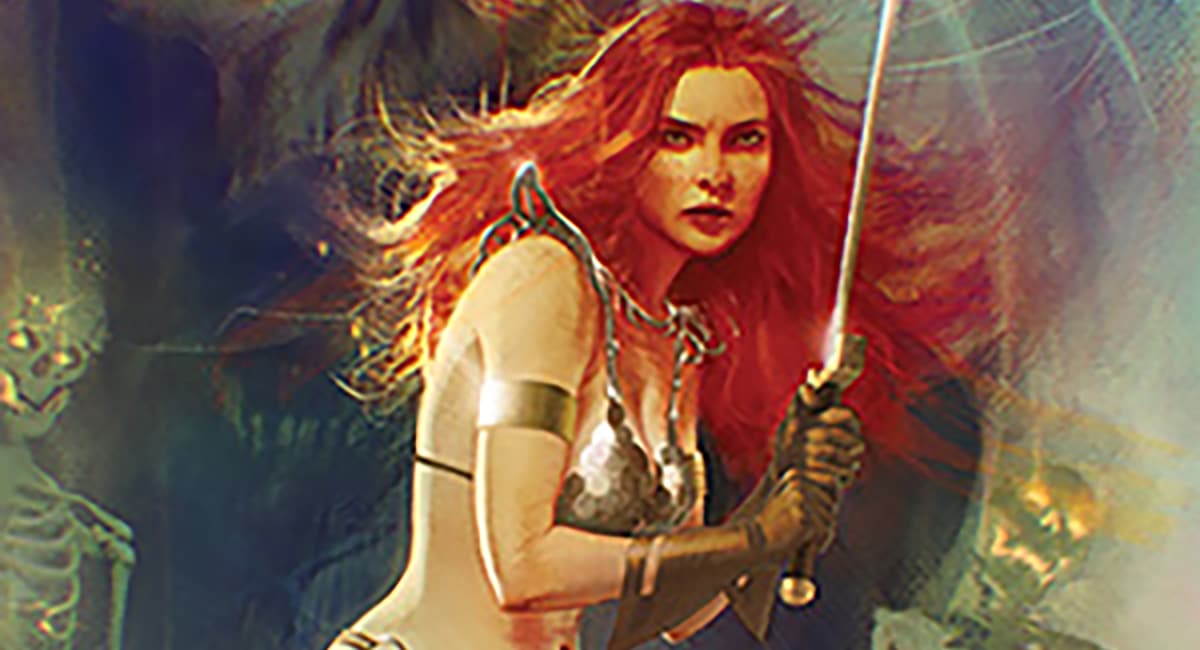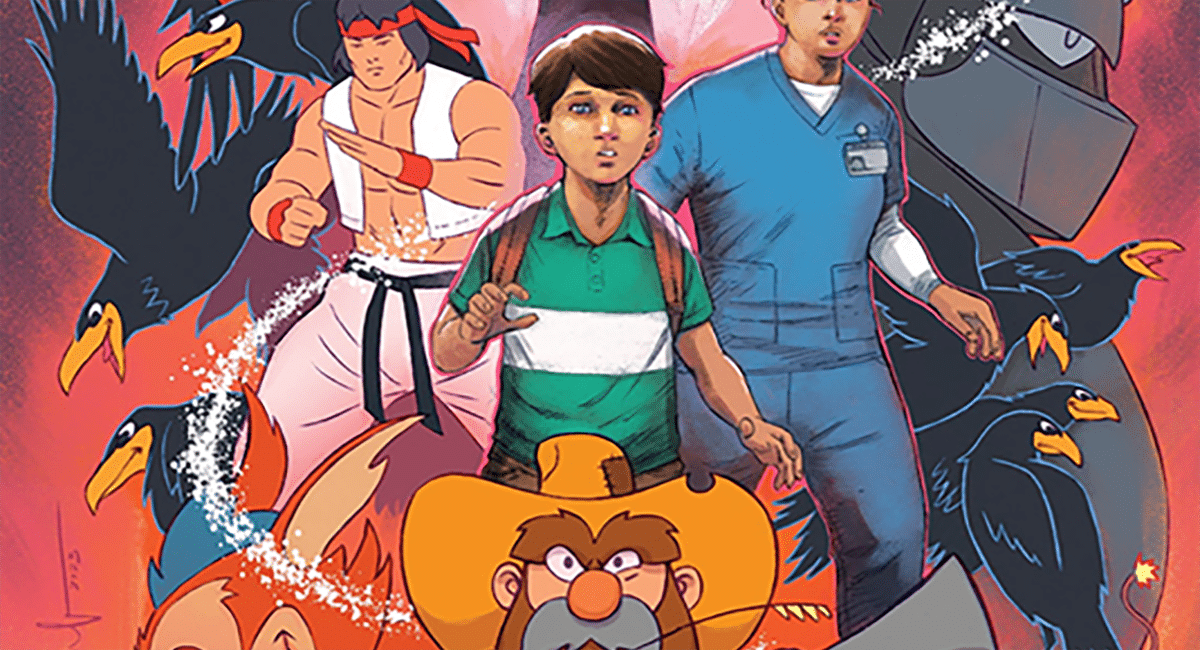Before Abbey Road, before Ed Sullivan, before countless records sold and souls touched, before they even were the Fab Four, the Beatles were an obscure band from an obscure, culturally irrelevant port town. No one believed they would amount to anything. Pop music and pop musicians were ephemeral, their identities and talent only as good for their brief moment of fame before fading from the stage. But one man saw beyond the executive shortsightedness of what popular music could aspire to be: true art.
That man was Brian Epstein, the manager who led the Beatles from their meteoritic rise from the Cavern Club in Liverpool to the “toppermost of the poppermost” of world adulation. Helped in part by Brian’s expansive vision and perspicacity, the Beatles became the most successful and influential band of all-time. Even though he helped usher Western culture into the liberating psychedelic age, there was a melacholic side to Brian: gay at a time where expressing such thoughts constituted criminal prosecution, Jewish in a time of rampant and acceptable cultural anti-Semitism, and a native Liverpudlian in a time where no one gave the city a second thought. Brian bravely faced all these challenges, but ultimately could not fight his inner demons and died an early death in 1967.
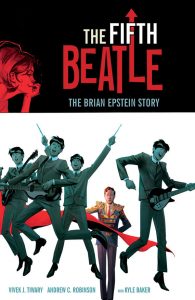
On the day of the Fifth Beatle’s release in paperback, I spoke with Vivek about the role of Brian as his “historical mentor,” what the journey of bringing this comic to the world has meant to him, what he has in store for fans, and how something as simple as a business card can tell you a lot about a person you admire.
AJ Frost: The last time we chatted about the Fifth Beatle two years ago, it was the one year anniversary of the original release. Since its launch and now Dark Horse released the new, extended paperback edition. How do you think the journey has been for you over these last several years?
Vivek Tiwary: It has been one never-ending stream of dreams coming true. I feel like every time I say “It’s a Dream Come True,” about two weeks later I sound like a broken record: something even cooler and bigger happens. It really has been such a surreal, wonderful, joyful, happy, and humbling ride. Just to see the book three years later to continue—from a pure business standpoint—to sell is remarkable to me. But also, I think at this point, we really have proven that the Brian Epstein story is a universal, inspirational, human story.

When we [artists Andrew C. Robinson, Kyle Baker, and I] first launched it, it was clearly originally for Beatles fans and comic book fans, and then we were doing a lot of outreach to the LGBTQ community [the Fifth Beatle was named a finalist for the Lambda Literary Award], then general music fans, the Jewish community. And now we’re not targeting any particular community. The book had already reached the Beatles fans and the comic book fans; I think the reason it’s continuing to sell is because it’s no longer for a particular niche audience. Now it’s reached a place where anybody who loves an inspiring underdog story about a dreamer—that’s everybody, right? This is a story for everyone.
And right now, it’s being adapted it into a television series. When we talk about film and TV comparables, I constantly say “Yeah, technically it’s a music-related biopic” but this project isn’t Ray or Walk The Line; this is closer to Rocky or Billy Elliot. And just like you don’t have to be an aficionado of boxing to like the Rocky movies, or, certainly, you don’t have to be a fan of ballet to appreciate Billy Elliot, that’s what we have done with the Fifth Beatle: to have a story that is not just for Beatles fans. The fact that the Fifth Beatle is now out in paperback (at such an affordable price!) shows that the story goes beyond retailer’s definitions; anyone can be inspired by it.
Frost: What are some of the bonus materials readers will see in the paperback edition?
Tiwary: The changes to the paperback are right there from the very first pages. In the original edition, Billy J. Kramer’s introduction mentioned how it was “preposterous that Brian Epstein has not been inducted into the Rock N’ Roll Hall of Fame in the non-performer category.” [Kramer was another artist on Brian’s management roster.] The new edition features a postscript that explains that when the original essay was written, Brian had not been inducted and now he has.
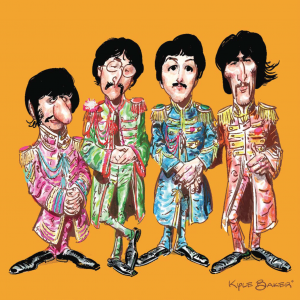
At the back of the edition is a new essay by Howard Cruse [more detail below], as well as a sketchbook by Andrew Robinson that shows his early character designs that weren’t quite working (he worked hard to get John, Paul, George, Ringo, and Brian designs as perfect as possible). Readers will see his process on how a pencil sketch becomes a full page of art. And then there is a section from Kyle Baker that includes a number of Beatles portraits, sketches, and artwork, much of it never-before-seen, particularly for this expanded edition. It’s a great joy for there to be more of Kyle’s art in the book because his contribution in the comic, by design, is a limited eight-page section about the Beatles in the Philippines.
After that, readers will see an excerpt from my TED Talk called “The Birth of the Beatles: An Impossible Dream” as well as a memorabilia gallery. Over the years, I’ve collected a lot of cool Beatles stuff and Brian Epstein stuff, so I included a handful of those items from my personal collection into the book.
Frost: What were your feelings when Dark Horse told you they were interested in putting out a paperback edition of the Fifth Beatle?
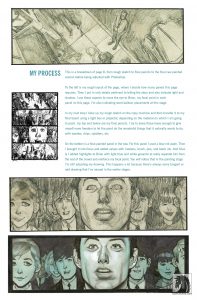
Tiwary: I was proud of the fact that the hardcover edition has a real coffee-table feel to it. It’s oversized, it’s elegant, it looks like an art book. I appreciate that it’s a milestone to sell enough of one’s hardcover to warrant a paperback release, so I was very pleased when Dark Horse said: “It’s time for the paperback!” But you know, I was a bit nervous. I thought that maybe the paperback version would lose a little bit of the elegance and some of its sophistication. I was surprised that Dark Horse kept the oversized format; you don’t see a lot of books in this size in paperback, especially not in comics. When it came back and I saw the first proofs, I saw that the book kept its elegance that we saw in the hardcover. Even including the forty pages of bonus materials, which adds a sort of weightiness to the book, really differentiates it; it doesn’t feel like a cheap trade paperback.
Frost: Yeah, I considered that too. The bonus materials added to paperback make it feel heftier, which I feel only enhances the weight that Brian felt on his shoulders as the trailblazer of popular music as an artform. And to me, one of the more fascinating items you included in the bonus section is Brian’s actual business card. Why did you include this in the expanded edition?
Tiwary: Like any good fanboy, I’m a collector and Brian’s business card is one of my most prized possessions. Brian has been someone who has been so inspirational to me. The fact that he was an outsider: gay, Jewish, and from Liverpool inspired me as a first-generation American, son of immigrants, to chase my dreams. I often describe Brian as my historical mentor. And as such, anything related to Brian that I can get my hands on is incredibly meaningful. For me to own one of his business cards—something so tied to his day-to-day efforts—is really special.
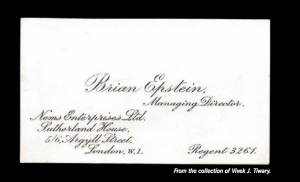
Adding to that, the particular business card featured in the bonus materials was given me to as a gift by Nat Weiss, who was the Beatles’ American attorney and became Brian’s best friend and his confidante. Nat too was gay, and together they shared the struggles of being gay in the 1960s; Nat opened up to me and was a great source of inspiration and information for the book. So the fact that it was Nat who gave me the business card gave it so much more meaning then if I had just bought it an auction or somewhere. And when you actually see the business card, it’s flamboyant! It’s elegant and flowery! Yet, it has no fancy logos on it. It’s super simple, yet it takes you some time to read the writing, more so than a standard business card. That’s Brian to a T: elegance and simplicity.
Frost: I think it’s not too much to say you’re something of an entertainment polymath, working in all sorts of media—theater, television, and comics of course—to tell interesting stories. Moving on from the Fifth Beatle for a moment, can you talk about Asha Ascending?
Tiwary: Sure! Asha Ascending is an illustrated, young adult novel that artist Sara Richard and I are serializing for FREE online and every month or so we put up a new chapter. The story takes place a near-future New York City where teenagers access the internet through surgical implants, little buttons in the back of their heads. And in this world, a brilliant teenage coder named Asha has to help an irresponsible party boy named Hal save his mother’s life as they race against the clock and an evil faction to unlock the code to immortality. I know that sounds like a bit of handful, but it reads very much like something found in the YA space.
Sara is best known in the comic book circles for being the cover artist for My Little Pony and Jem and the Holograms. Her style is so unique, influenced by art deco and traditional Japanese paintings, I think you’d see why her art makes so much sense for the YA space. I’m not sure why the YA publishing world hasn’t snatched her up and made her too busy to work in comics [Laughs]. I wanted to grab her before it was too late, though she also happens to be a dear friend of mine. It’s been a real joy to work with her.
This is a project I’m totally proud of. Sara and I are putting it up as something for the fans and we are looking for a lot of fan feedback on it. We have the ending mapped out, so we know where it goes But in terms of the journey to get there, we’re definitely looking to be influenced by our fans: If our fans love a minor character or a particular element of the series, we will write more of that character or element, like how television shows are written. And in some ways, this project is progressive: I don’t anyone else doing exactly like Sara and I are doing. On the one hand, I think we’re utilizing the best of modern technology (trailblazing in a little way) and on the other hand, I think what we’re doing hearkens back to what Charles Dickens did in Victorian times: serializing his stories in newspapers. So we’re going to back to the dawn of the novel, while also taking advantage the best that technology has to offer.
Frost: And what about the recent announcement to take Dave Roman’s Astronaut Academy to the screen? How did that come about?
Tiwary: Astronaut Academy is a beloved series that was originally a webcomic that was compiled into two graphic novel sets. I’ve been a fan of Dave Roman for a long time. The easiest way to think of Astronaut Academy is that it’s like “Harry Potter in Space.” From a television/film perspective, you might say it’s like Harry Potter meets Stranger Things. It definitely has an ‘80s sensibility in the way that Stranger Things does. Dave and I both grew up on the great ‘80s kids movies like Goonies and Explorers and those sorts of films; the early Steven Spielberg films. So it’s going to have that tonal feel to it, though from a narrative standpoint it is very much Harry Potter in space: the story is a bunch of kids training to be space heroes when the universe is faced with a threat that only the kids can avert. At the same time, they have to be good students and overcome heartbreak and final exams and all the things that happen in school.
I’m incredibly excited about it! It’s a series that I’ve loved for a long time. It’s great fun to be working with Dave. It has the potential to be a successful worldwide franchise that the whole family can enjoy. Expect some announcements in the next few months.
Frost: Going back to the Fifth Beatle and because you share an alma mater [Wharton School of the University of Pennsylvania] with a certain GOP presidential candidate, I wanted to ask how you think the story relates to what is happening now in American politics and culture, especially considering how many people are now placing a lot of their hopes in outsiders disrupting the system?
Tiwary: In a non-issue oriented way, the Fifth Beatle will leave readers wanting to go out into the world and make a difference. One of the things that the expanded edition has is an essay by Howard Cruse, the pioneering cartoonist who wrote Stuck Rubber Baby and is a legend in the world of LGBTQ comics. In the initial version of the Fifth Beatle that was released three years ago, he wrote an essay called “Freedom to Marry,” alerting people to the fight for marriage equality. Obviously since then, thanks to the Supreme Court, that fight has been won! So, Howard updated his essay, now called “Freedom for All Americans,” and reflects on his experiences fighting that fight and what work is left to be done now that there is still is a lot of work to be done for equality across the country.
The reason this essay is even in the expanded edition is that I don’t view the Fifth Beatle as an activist book per se, but I do hope that it is an inspiring book. As I said, Brian’s life inspired me to chase my own dreams. I think that the message of the Fifth Beatle is that no dream is too impossible and no person too unlikely to realize that dream. I hope that when people finish the Fifth Beatle, they will walk away inspired to make a change in the world, to follow their dreams, to pursue their passions, and make the world a better place. I always say that through his work with the Beatles, Brian brought a lot of love into the world.
I hope that’s what my readers will do, and Howard’s essay draws attention to one way that you can make a difference in the world by fighting for LGBTQ equality. We call that one out in particular because that’s a fight that would have made a tremendous difference to Brian’s life: he was gay during a time where it was literally a felony, and he died before those laws were changed. He died at the age of 32 having spread so much love into the world with this work with the Beatles and yet he never had a proper boyfriend himself. Had there been more equality for gay people during Brian’s day, he would’ve been a happier person; he would’ve died less lonely.
Frost: Ok, last question! Just thinking about the entire journey of the Fifth Beatle, from its earliest conceptions to this new, dare I say, definitive paperback edition, how has the journey affected you both personally and professionally? Where do you go from here?
Tiwary: I’m still feeling such an overwhelming sense of joy to be working on the Fifth Beatle. I’m obviously the writer of the book and the television show (and a producer on the latter), but I do have to say that I’m just one part of the Fifth Beatle. It’s no longer about me or Andrew or Kyle, but it’s now about the broader community of people who know the Brian Epstein and have been inspired by it. They want to share it. The fans realize that everybody should know this story, and as I was just saying, should be used to make a positive change in the world. It’s a worthy message to share; it’s much bigger than me. I think of the Fifth Beatle as an entity whose mission is to spread the unsung story of Brian Epstein and thereby make the world a better place by encouraging people to chase their dreams.
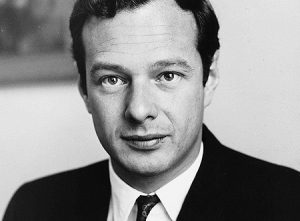
You know, Brian Epstein was inducted into the Rock & Roll Hall of Fame subsequent to the first printing of the book. They called me to consult on his induction. I wrote an essay called “The Curtain Rising” which is included in the paperback edition, and to me, my efforts in consulting the Rock & Roll Hall of Fame… that was pursuing my mission of the Fifth Beatle. Even though it didn’t have anything to do with the book, it had a lot to do with championing Brian’s legacy and, to me, that’s what the Fifth Beatle is all about.
You can follow upcoming news about the Fifth Beatle on Facebook, Twitter, and the official website.
The Fifth Beatle
Vivek J. Tiwary, Andrew C. Robinson, & Kyle Baker
Dark Horse
$14.99


